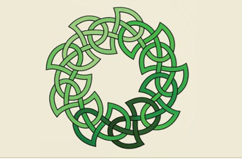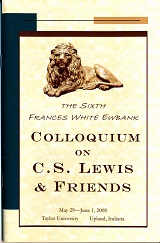Event Title
Session 1-A: Theology in the Writings of Sayers, Lewis, and Williams
Location
Taylor University, Metcalf 101
Start Date
29-5-2008 3:30 PM
Description
"Dorothy L. Sayers: An Exemplar for Lay Theology" - Christine Fletcher
This paper argues that all Christians are called to serious theological reflection on the Creed within their live and that Sayers’s life and work gives us an example of intellectual rigor that finds the doctrine of the Church about Christ and the Trinity truly good news. The paper looks at Dorothy L. Sayers’s theological method as an exemplar for how lay theologians should work. It examines the two dominant themes of her theological writing: the Incarnation and the Trinity, in light of her life and her practice of using her talents as a writer, specifically a playwright, to produce new theological insights. The first part of the paper gives a short history of her religious formation and adult faith, and details her fascination with Christ and the mystery of the Trinity from childhood through her adult life. The second section of the paper examines the origin of her analogy of the Trinity in her own life as a writer, and especially her experience as a playwright.
"Flesh Knows What Spirit Knows: Mystical Substitution in Charles WIlliams's Vision of Co-inherence" - Susan Wendling
This paper focuses on the spiritual implications for Williams’ “doctrine of substituted love” and his understanding of the “way of exchange.” After detailing the principles of the Order formed by Williams in 1939, the three levels of “the household of faith” seen in Williams’ poem, “The Founding of the Company,” are discussed. The implications of incarnational theology for Williams’ “theology of romantic love” and the “Way of Exchange” are seen in the great “fusion” of “flesh knowing what spirit knows” and Williams’ belief that “it is in our bodies that the secrets exist.” Three types of Christian actions involved in the practice of substituted love are detailed: forgiveness, sacrifice, and the bearing of burdens. The paper concludes with an investigation into exactly what Williams meant by the practice of “compact prayer” whereby one person actually undertakes to carry another person’s burden of fear, sorrow, or even physical pain.
"Nothing is Yet in Its True Form'': Common Ground between C.S. Lewis and the Eastern Orthodox Fathers Concerning the Doctrine of Theosis" - Jordan Zandi and Casey Knott
One theme throughout the works of C.S. Lewis is the idea of deification, known in the Orthodox world as theosis. For Eastern Orthodox Christians, salvation is a process through which we "...become partakers of divine nature." Thus, men may become divine and share in the divinity of God. In Mere Christianity Lewis writes, "He said (in the Bible) that we were 'gods' and He is going to make good His words...He will make the feeblest and filthiest of us into a god or goddess." Gregory Palamas explains this God-given divinity as a light or energy: "The deifying gift of the Spirit is a mysterious light, and it transforms into light those who receive its richness." While Lewis never uses the Orthodox term, this paper will examine Lewis' own view of theosis and compare it to that of the Eastern Fathers, locating common ground in their respective soteriologies.
Moderator: Catherine Barnett
Event Type
Paper
Link to Papers
Dorothy L. Sayers: an Exemplar for Lay Theology
"Flesh knows what Spirit knows" Mystical Substitution in Charles Williams' Vision on Co-Inherence
”Nothing is Yet in Its True Form'': Common Ground between C.S. Lewis and the Eastern Orthodox Fathers Concerning the Doctrine of Theosis (Not available)
Session 1-A: Theology in the Writings of Sayers, Lewis, and Williams
Taylor University, Metcalf 101
"Dorothy L. Sayers: An Exemplar for Lay Theology" - Christine Fletcher
This paper argues that all Christians are called to serious theological reflection on the Creed within their live and that Sayers’s life and work gives us an example of intellectual rigor that finds the doctrine of the Church about Christ and the Trinity truly good news. The paper looks at Dorothy L. Sayers’s theological method as an exemplar for how lay theologians should work. It examines the two dominant themes of her theological writing: the Incarnation and the Trinity, in light of her life and her practice of using her talents as a writer, specifically a playwright, to produce new theological insights. The first part of the paper gives a short history of her religious formation and adult faith, and details her fascination with Christ and the mystery of the Trinity from childhood through her adult life. The second section of the paper examines the origin of her analogy of the Trinity in her own life as a writer, and especially her experience as a playwright.
"Flesh Knows What Spirit Knows: Mystical Substitution in Charles WIlliams's Vision of Co-inherence" - Susan Wendling
This paper focuses on the spiritual implications for Williams’ “doctrine of substituted love” and his understanding of the “way of exchange.” After detailing the principles of the Order formed by Williams in 1939, the three levels of “the household of faith” seen in Williams’ poem, “The Founding of the Company,” are discussed. The implications of incarnational theology for Williams’ “theology of romantic love” and the “Way of Exchange” are seen in the great “fusion” of “flesh knowing what spirit knows” and Williams’ belief that “it is in our bodies that the secrets exist.” Three types of Christian actions involved in the practice of substituted love are detailed: forgiveness, sacrifice, and the bearing of burdens. The paper concludes with an investigation into exactly what Williams meant by the practice of “compact prayer” whereby one person actually undertakes to carry another person’s burden of fear, sorrow, or even physical pain.
"Nothing is Yet in Its True Form'': Common Ground between C.S. Lewis and the Eastern Orthodox Fathers Concerning the Doctrine of Theosis" - Jordan Zandi and Casey Knott
One theme throughout the works of C.S. Lewis is the idea of deification, known in the Orthodox world as theosis. For Eastern Orthodox Christians, salvation is a process through which we "...become partakers of divine nature." Thus, men may become divine and share in the divinity of God. In Mere Christianity Lewis writes, "He said (in the Bible) that we were 'gods' and He is going to make good His words...He will make the feeblest and filthiest of us into a god or goddess." Gregory Palamas explains this God-given divinity as a light or energy: "The deifying gift of the Spirit is a mysterious light, and it transforms into light those who receive its richness." While Lewis never uses the Orthodox term, this paper will examine Lewis' own view of theosis and compare it to that of the Eastern Fathers, locating common ground in their respective soteriologies.
Moderator: Catherine Barnett


